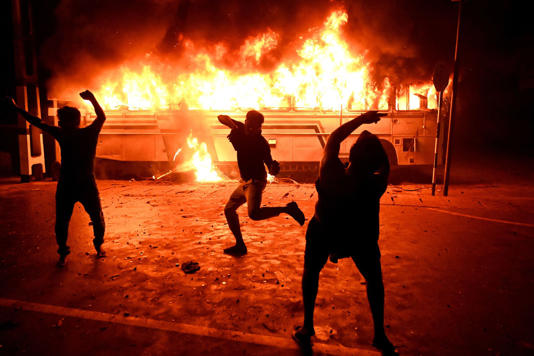
Hundreds of militants clashed with police outside Sri Lanka President Gotabaya Rajapaksa’s private residence into the early hours on Friday amid widespread anger over surging living costs and daily power cuts stemming from economic mismanagement by the corrupt Rajapaksa regime.
Crowds screamed “Go home Gota” at the house on the outskirts of Colombo. Police fired tear gas and water cannons after the militants broke past the barricades and pelted stones.
Rajapaksa is responsible for war crimes while serving as Sri Lanka’s defense secretary and leading death squads during the war between the Sri Lankan government and the insurgent Tamil Tigers. He is widely reviled for his corruption and nepotism, as his wealthy family’s opulent displays of wealth during the financial crisis has further angered many Sri Lankans.
Nearly 50 people were injured and protesters set fire to an army bus and a jeep. The police imposed a curfew in several areas of Colombo and its suburbs, which was later lifted on Friday 5:00 a.m. local time. Dozens of people were arrested for their alleged role in the demonstrations.
Demonstrations took place across the country, with one group blocking a busy road from the capital to the central town of Kandy late on Thursday, setting fire to logs to block vehicles from moving, local media said.
The Sri Lankan people are faced with debt obligations, limited foreign reserves and inflation which is the highest in Asia. People are queuing for hours for fuel and living with daily power cuts that stretch for more than half a day as supplies of diesel are running out and the government lacks the dollars to pay for shipments.
Sri Lanka was the first country in Southeast Asia to embrace neoliberalism in the ’70s, with the country becoming a laboratory for the ruthless capitalist policies of IMF and World Bank, both of which have served as tools for American imperialism. These global financial institutions enforce neocolonial relations, as countries in the Global South are “bailed out” in exchange for structural adjustment policies, privatization, and opening the country to increasing foreign investment and tourism, allowing Western capitalists to profit while the poor suffer. These policies were enacted in Sri Lanka at the same time as anti-Tamil pogroms took place, sparking the Tamil Tigers to begin their insurgency.
The Sri Lankan government is now seeking a new loan from the International Monetary Fund while asking for bilateral aid from countries including China, India and Bangladesh. Sri Lanka has raised interest rates, devalued the rupee and reduced stock-trading hours in a bid to preserve electricity and foreign currency.
All 26 Sri Lankan cabinet ministers, aside from the president and prime minister, have now resigned. Militants remain focused on overthrowing the entire Rajapaksa regime, which responded to the uprising by blacking out social media.